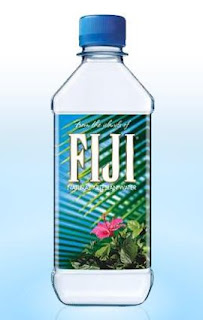 If you're at all tuned in to the discussion of global warming, you will know that one of the issues being bandied about is the amount of greenhouse gases produced by the transportation of food.
If you're at all tuned in to the discussion of global warming, you will know that one of the issues being bandied about is the amount of greenhouse gases produced by the transportation of food. Think Fiji Water.
If you drink water from the faucet in your kitchen, almost no greenhouse gases are involved. (There's a tiny bit of energy involved in either the washing of the cup that you use or the creation of the paper cup that you throw out later.)
However, if opt for a bottle of Fiji Water instead, then you have an entirely different situation. Your water is encased in a bottle made from petroleum products. The water has been shipped from the other side of the planet through the burning of a ridiculous amount of fuel. And, the bottle will almost never decompose, although you could recycle it. But, recycling means a big truck comes to your house, burning fuel, and carries the bottle to a recycling plant where even more energy is harnessed to convert your bottle back into something usable.
So, tons of people promote the idea of being a "locavore," someone who eats and drinks what she can find locally. Local foods use less fuel to transport them to your house, reducing your carbon footprint.
The New York Times has a great column called Freakonomics, and one of its authors devoted some time to this issue. It turns out, there may be another side to this story. It might be better (and more efficient) to allow food to be grown throughout the world and shipped over long distances.
Think apple juice. Yes, you could probably plant apple trees in your backyard and make your own apple juice. But, how much would the tree cost? How much would an apple press cost? How much time would it take you to create the juice? How much juice would you have when you were done? How much money would you waste in the process? Wouldn't it be better to buy apple juice at the grocery store, and give all the money you could have spent to an organization promoting awareness of climate change, if that was your concern?
Plus, there's the taste thing. Your own apple juice might be really sour. (Have you ever tried Fiji Water? It's remarkably good for something that's not supposed to have any taste.)
Most decisions regarding climate change boil down to a cost-benefit analysis. What is the cost of your decision? How much benefit will you enjoy from your decision? If the water tastes great, that's a benefit to you, but if it contributes to the warming of the planet, then it may turn out to cost you. (Think WALL-E.) The ideal choice is one which has the least cost and the greatest benefit. If your tap water tastes like metal pipes, it may be undrinkable. Your alternative should be something which produces good water without creating an unreasonable amount of waste. Brita water filters are an option. You get the idea.
On a random note, I heard on NPR yesterday that American SUVs consume more gasoline than all of India. Wow.
No comments:
Post a Comment